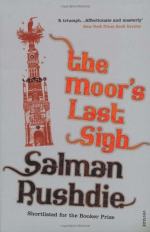|
This section contains 664 words (approx. 2 pages at 400 words per page) |

|
From the moment that Salman Rushdie was forced into seclusion by the price placed on his life in 1989, it has been difficult to assess his work without considering all of its possible connections to his political predicament. Rushdie has commented that "The book is grounded in my experience of these past years," and it is not irrelevant to consider how Rushdie is using aspects of his own seclusion when he describes Moraes's incarceration in a Bombay prison and then in a lunatic's castle in The Moor's Last Sigh.
Of course, an author's entire experience can become a factor in his writing, and Rushdie has acknowledged that his books "have a spirit of connection with real life," as Ian Hamilton puts it in his very valuable biographical essay, "The First Life of Salman Rushdie" (The New Yorker, December 25, 1995 and January 1, 1996, pp. 89-113).
Rushdie's troubled relationship with his...
|
This section contains 664 words (approx. 2 pages at 400 words per page) |

|




